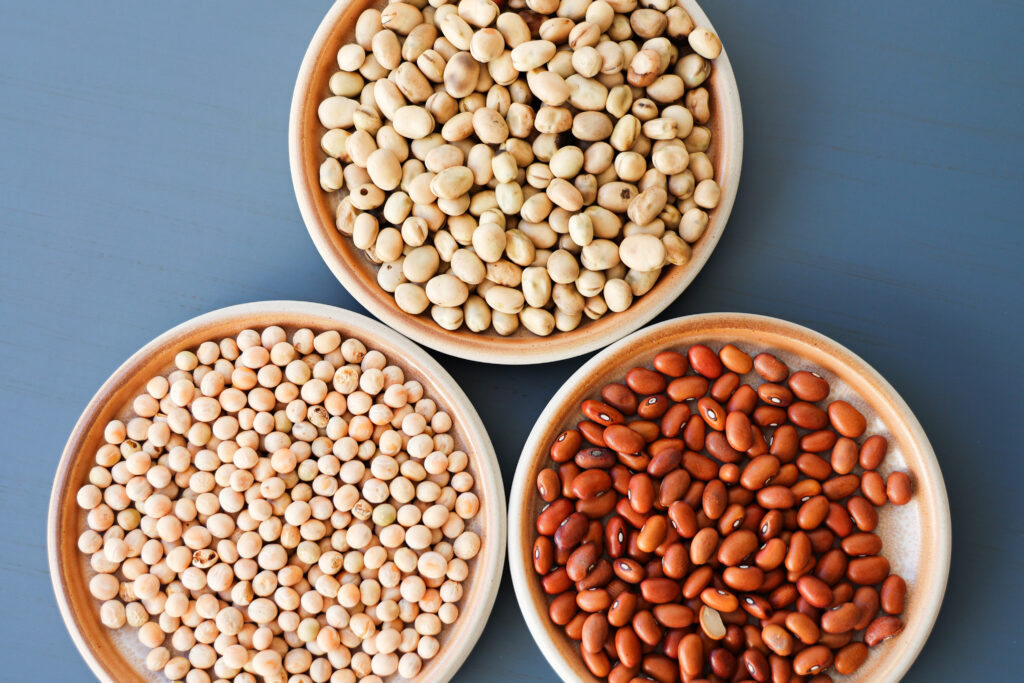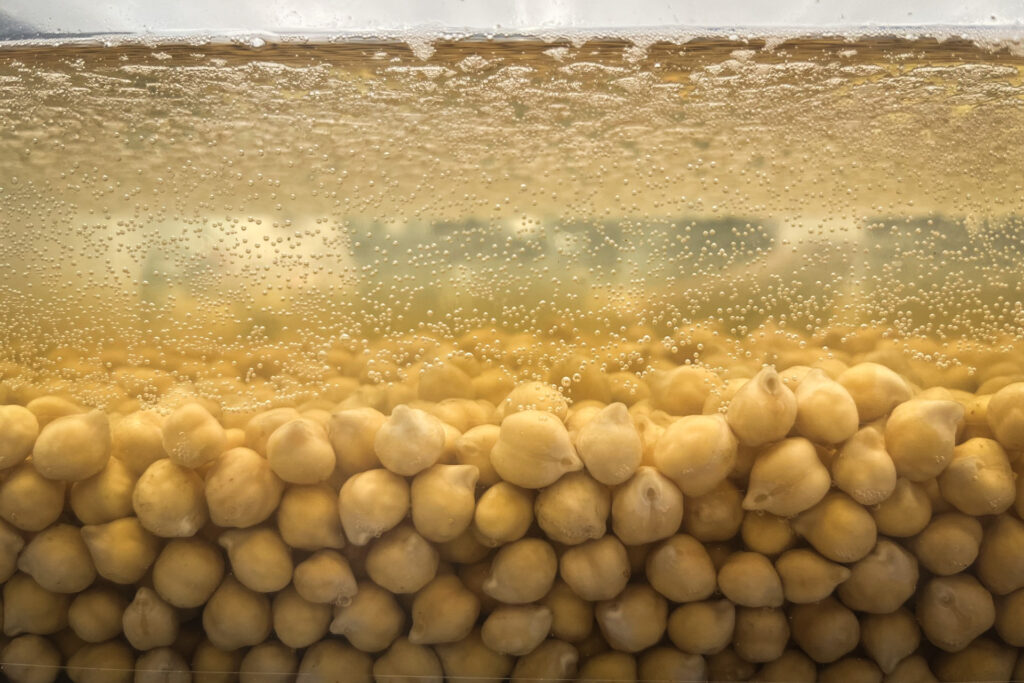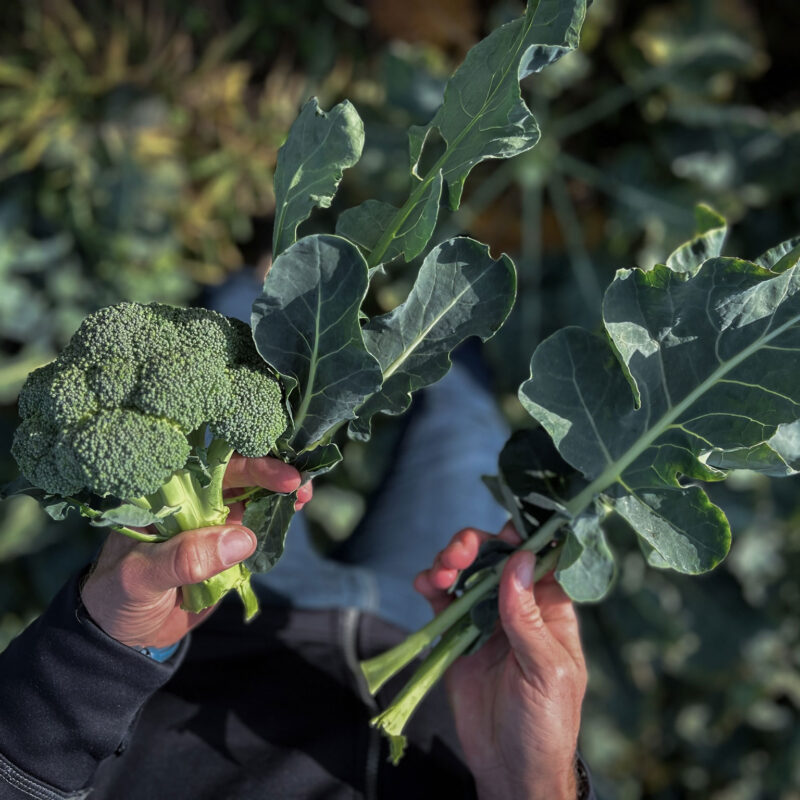More Legumes on the Plate
Replacing meat with other protein sources, such as legumes, benefits both health and the environment. For several years, Axfoundation has been trial-cultivating new and older varieties of legumes and developing various products that are now sold in stores and through wholesalers. However, there is still a vast untapped potential in beans, lentils, and peas as raw materials in food – with innovative applications ranging from legume-based mince to legume flour. To increase the consumption of Swedish-grown and Swedish-processed legumes, Axfoundation collaborates with a wide range of stakeholders. The goal is to develop the value chain for legumes and create tasty, easily accessible products and recipes.

Legumes are cultivated on only around two percent of the arable land in Sweden, despite their many benefits.
The Issue
Legumes are cultivated on only around two percent of the arable land in Sweden, despite their numerous taste, health, climate, and agricultural benefits. Moreover, the majority of the harvest is used as animal feed rather than food. The Swedish-grown beans, lentils, and peas that are ready to eat often have to take a detour abroad, as Sweden lacks large-scale processing facilities. These transports double the climate footprint, and since the added value mainly occurs abroad, profitability is hampered. This, of course, affects the willingness to grow legumes. Legumes also offer significant health advantages. According to EAT Lancet, quadrupling our legume consumption would be beneficial for the health.
Our Solution
The project’s goal is to develop tasty and accessible products and recipes that fully utilize the potential of legumes, as well as to increase the processing of legumes in Sweden. This way, a larger portion of legume production can end up on the plate, while also potentially increasing the margins for primary producers. A wide range of stakeholders are collaborating to make processed legumes more available to the industry and simultaneously increase demand for these products. Increased production and consumption of legumes would simply benefit the environment, health, and Swedish farmers.
Project Goals
- Doubled consumption of Swedish legumes – including among consumers who eat meat.
- Increased willingness among primary producers to cultivate legumes for human consumption.
- Enhanced self-sufficiency and resilience through developed infrastructure and processing for legumes in Sweden.
- Reduced land use, lower climate footprint, and decreased need for nitrogen fertilizers.
- Improved profitability for Swedish primary producers.

An important part of our work is bringing together the entire value chain and creating new collaborations that can increase the demand for Swedish-grown and Swedish-processed legumes.
The low cultivation of legumes in Sweden limits society’s ability to benefit from their advantages and can be described as a market failure.
– The Swedish Board of Agriculture’s report ”Ökad odling av baljväxter till livsmedel och foder”
Our Work
For several years, Axfoundation has been working to increase the production of legumes for food and to boost their consumption. Forming new partnerships to drive demand for Swedish-grown legumes is a crucial part of this effort. This includes making prepared legumes more accessible to the industry while simultaneously fostering greater demand. Through ongoing product development that harnesses the beneficial qualities of beans, the goal is to increase demand for Swedish-grown and processed legumes. A key success factor in boosting legume consumption among consumers is to create products that can be easily incorporated into everyday cooking. Legume flour can play an important role in this, which is why Axfoundation is involved in the Legume Flour project, led by Kalmar-Öland Garden Products.
By incorporating legumes into meals, the food becomes healthier, environmental impact is reduced, and both taste and texture are improved. It’s an easy way to create more sustainable food.
– Veronica Öhrvik, Project Manager at Future Food, Axfoundation
Did You Know That
- Cooked legumes contain as much protein as meatballs and falukorv (Swedish sausage).
- Legumes offer significant agricultural advantages, both as an important part of crop rotation and due to their low need for nitrogen fertilizers.
- Legumes can fix nitrogen directly from the air, reducing the need for added nitrogen. This benefits the climate since the potent greenhouse gas nitrous oxide is released from nitrogen-fertilized fields, and the production of mineral fertilizers is highly energy-intensive.
- A more diverse crop rotation, including legumes, reduces pressure from weeds and crop pests, which can lead to a decrease in the overall use of pesticides.
- Researchers estimate that if half of the meat were replaced with Swedish-grown legumes, greenhouse gas emissions could be reduced by 20%. Additionally, 23% of the cultivated area could be used for purposes other than feed production.
- A major barrier to increased domestic legume production is the lack of functional infrastructure for processing legumes, such as food-grade facilities for cleaning, peeling, processing, and packaging.
0
percent of the Swedish arable land is used for legume cultivation.
0
percent of the legume production in Sweden consists of feed.
0
grams of legumes are consumed by Swedes per day, one-third of which are domestically produced.
0
grams of legumes per day are recommended by researchers for consumption.
Results
Large-scale Value Chain for Swedish-grown Pulses
In March 2025, Axfoundation, together with Kalmar Ölands Trädgårdsprodukter, Sevan, and Martin & Servera, introduced Sweden’s first large-scale and entirely domestic value chain for Swedish-grown pulses. In this value chain, the pulses are grown and shelled by Kalmar Ölands Trädgårdsprodukter, cooked and prepared by Sevan in Sigtuna north of Stockholm, and sold through the wholesale supplier Martin & Servera to restaurants, hotels, schools, and hospitals.
Among the products launched were soaked, cooked, and frozen chickpeas, kidney beans, and white beans, as well as food innovations like falafel made from yellow peas and grey peas, and a patty made from yellow peas containing seven percent broccoli leaves. The initiative is the result of long-term collaboration between Axfoundation and key players across the entire value chain – from farm to fork – aimed at enabling a system shift, strengthening Sweden’s food preparedness, and increasing the use of Swedish-grown pulses. The broccoli leaves in the patty originate from The Whole Plant project and are sourced from Swedish farmers, produced by Sorunda Syd Grönsakshallen. Read more about the launch here.
Swedish legumes Cultivation
Axfoundation’s previous project, Swedish Legumes Cultivation, has helped increase interest in Swedish-produced legumes and has also resulted in a range of different products. One successful initiative is Swedish Legume Mince, which is currently sold wholesale (under the brand Svensk Baljväxtfärs) and in grocery stores (under the brand Svenskodlad Vegofärs). The Swedish-grown mince has made its way into home kitchens, school kitchens, and lunchrooms – it is even included in chef Jessie Sommarström’s 50/50 Meat and Bean Patty, which is sold at IKEA.
50/50
Swedish legumes are now also used as ingredients in various products, where they contribute both flavor, texture, and nutritional benefits. A good example is Fish cakes with bream and fava beans, which was developed within the Smart Swedish Seafood project.
In connection with the project Sweet Lupin – The Nordic Soy, Axfoundation produced a report that demonstrated, among other things, that sweet lupin and fava beans can replace soy in both food products and animal feed, potentially reducing costs for farmers.
Partners
To increase the consumption of Swedish-grown and processed legumes, Axfoundation collaborates with Kalmar Ölands Trädgårdsprodukter, Sevan, Leröy, and SLU.
In the “Legume Flour” project, partners also include Kalmar Ölands Trädgårdsprodukter (a farmer-owned association), SLU, Linneuniversity/Faculty of Health and Life Sciences, Lund University, RISE, CLUK, Ljungkvist Industriservice AB, Ulla Nilsson Konsult AB (project leader), Orkla Foods, Lantmännen, and Treans Lantbruk.























































